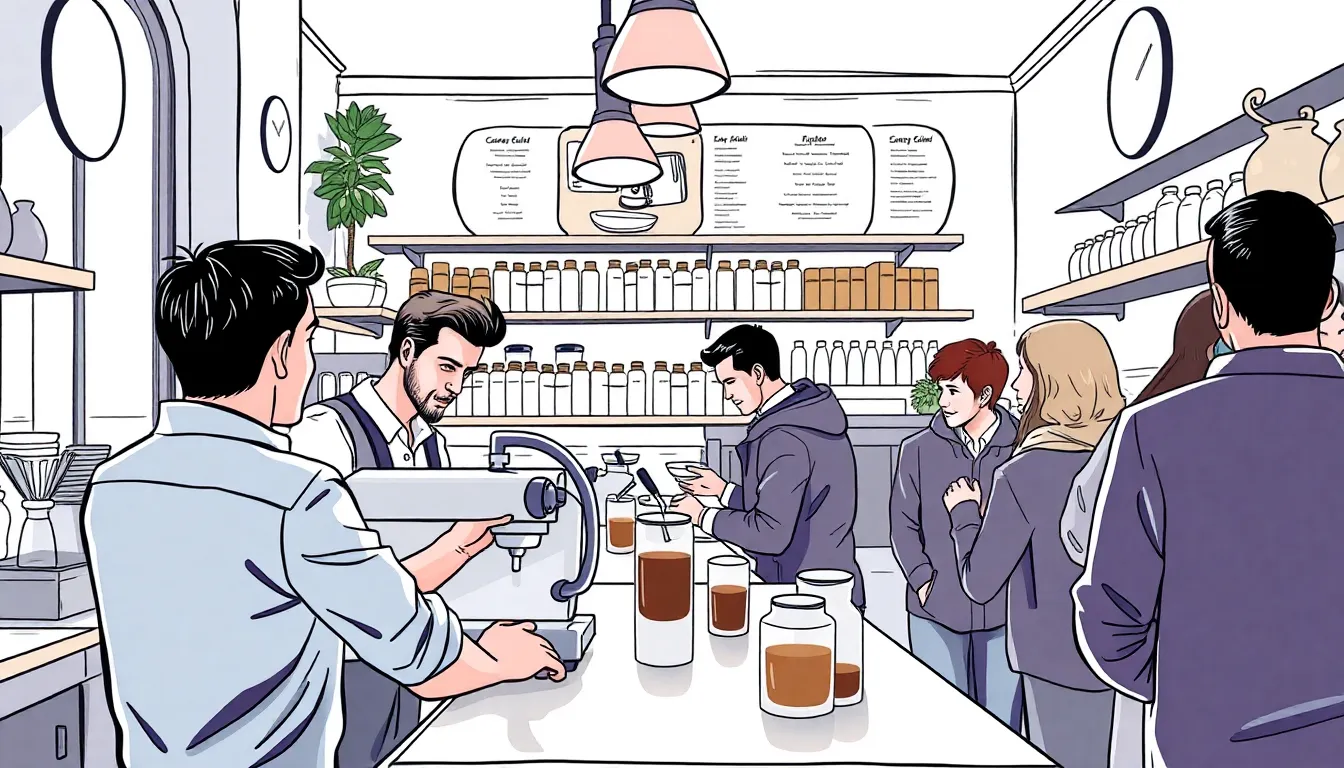Table of Contents
ToggleCoffee isn’t just a drink; it’s a global phenomenon that fuels mornings and sparks conversations. From the bustling cafés of Paris to the street vendors in Vietnam, coffee culture weaves a rich tapestry of traditions, flavors, and rituals. Each country puts its own spin on this beloved brew, making it a delightful adventure for the senses.
Coffee Culture Around The World
Coffee culture varies significantly across different countries, reflecting local traditions and preferences. Italy stands out with its espresso bars, where patrons enjoy quick shots of strong coffee. France presents café society, where people linger over leisurely conversations, often complemented by pastries.
In Vietnam, street vendors serve robust coffee mixed with sweetened condensed milk, creating a beloved local brew. Brazil, the largest coffee producer, emphasizes social gatherings centered around coffee, often served in small cups throughout the day.
Ethiopia holds a special place in coffee culture, where the coffee ceremony is a ritual involving brewing and tasting. Turkey features strong coffee, served thick and often flavored with cardamom, enjoyed during social exchanges.
In Japan, unique methods like siphon brewing showcases precision and artistry, creating a visual spectacle. American coffee culture highlights convenience, with the rise of specialty coffee shops and on-the-go options.
Colombia treasures its rich coffee heritage, with farmers cultivating beans on lush mountainous terrain. Each country showcases distinct varieties of coffee, leading to a rich tapestry of flavors and brewing techniques. Coffee not only reflects local customs but also connects people, fostering community and shared experiences.
Key Coffee Drinking Countries

Coffee culture spans the globe, and various nations exhibit unique drinking customs and traditions.
Italy
Italy’s coffee scene famously revolves around espresso. Locals enjoy strong shots of coffee at bustling espresso bars. The Italian approach emphasizes speed, often with patrons standing at the counter. In cities like Rome and Milan, it’s typical to see espresso consumed quickly before heading off to the next appointment. Cappuccinos, often reserved for morning hours, combine espresso with steamed milk, creating a frothy experience. Additionally, regional specialties further enrich Italy’s coffee offerings, such as macchiato and ristretto. These practices highlight Italy’s deep-rooted coffee traditions.
Ethiopia
Ethiopia holds a significant place in coffee’s history, often regarded as its birthplace. The Ethiopian coffee ceremony is a revered ritual that transforms coffee drinking into an art form. Typically, the ceremony involves roasting green beans over an open flame. Once roasted, beans are ground and brewed in a traditional pot called a jebena. Friends and family gather to share the resulting coffee. This communal experience fosters connections and underscores the importance of coffee in social interactions. Flavors from Ethiopian coffee are often complex and vibrant, reflecting the rich agricultural heritage.
Brazil
Brazil is the largest producer of coffee worldwide, shaping its coffee culture into something extraordinary. Social gatherings frequently revolve around coffee, with families and friends enjoying small cups together. Popular drinks include cafézinho, a sweetened, strong coffee served in tiny cups. Traditional coffee farms play a vital role, with picturesque landscapes filled with coffee plants. Brazilian coffee often showcases fruity and nutty flavors, appealing to diverse palates. This country’s coffee culture emphasizes hospitality, showcasing how coffee strengthens bonds among individuals. The connection to coffee is ingrained in Brazilian life, making it a staple in daily routines.
Unique Coffee Traditions
Coffee traditions around the world showcase diverse rituals and experiences that elevate this beloved beverage’s cultural significance. From ceremonies to tasting events, each custom reveals the unique flavors and social practices associated with coffee.
Coffee Ceremonies
Ethiopia’s coffee ceremony stands as a vibrant tradition that transforms the act of drinking coffee into a communal celebration. In this intricate process, green coffee beans are roasted over an open flame, releasing rich aromas that gather guests. After roasting, the beans get ground and brewed in a special pot called a jebena. This ceremony often lasts for hours, allowing for conversation and bonding among guests. Another notable example is Turkey’s coffee culture, where brewing strong coffee layers social dynamics. Coffee prepared in a cezve is served thick and rich, often accompanied by sweet treats. Each coffee ceremony emphasizes meticulous preparation and appreciation of flavors, creating intimate experiences.
Coffee Tasting Events
Coffee tasting events provide an avenue for enthusiasts to explore various flavors and brewing techniques. These events typically involve guided tastings, where participants sample diverse coffee beans sourced from regions like Colombia and Brazil. Cupping sessions allow for evaluating aroma, acidity, and body while fostering discussions on different brewing methods. Additionally, specialty coffee shops frequently host these gatherings, connecting people with similar interests. The rich flavors and textures of single-origin coffees intrigue even the most discerning palates. Engaging in these tastings enhances appreciation for coffee’s complexities, turning casual drinkers into informed aficionados.
Modern Coffee Trends
Coffee culture continuously evolves, influenced by global tastes and preferences. Modern coffee trends capture innovation and sustainability, redefining coffee experiences worldwide.
Specialty Coffee Shops
Specialty coffee shops transform the way people enjoy coffee. These venues focus on high-quality beans sourced from specific regions, emphasizing flavor profiles and brewing techniques. Craft baristas educate customers about unique varieties and their origins, enhancing appreciation for each cup. Cafés like Blue Bottle in the U.S. and Square Mile in the U.K. exemplify this movement, showcasing artisanal brews and tailored experiences. Espresso-based drinks and pour-overs attract enthusiasts, catering to a growing demand for specialty offerings. The inviting atmospheres of these shops also foster social connections, turning coffee consumption into a communal activity.
Coffee and Sustainability
Sustainability plays an essential role in today’s coffee industry. Many consumers seek ethically sourced beans, prompting brands to focus on fair trade and organic practices. Organizations like Rainforest Alliance and Fair Trade Certified promote environmentally friendly methods, ensuring better wages for farmers while reducing environmental impact. Coffee roasters increasingly prioritize sustainable packaging and eco-conscious business operations. For instance, companies like Stumptown Coffee Roasters are investing in direct trade relationships, guaranteeing a fair price to producers. As the conversation around climate change grows, fostering interest in sustainable coffee cultivates an informed customer base passionate about preserving coffee’s future.
Coffee culture is a vibrant tapestry woven from diverse traditions and practices across the globe. Each country brings its unique flair to the coffee experience creating a rich landscape of flavors and rituals. From Ethiopia’s communal ceremonies to Italy’s bustling espresso bars coffee serves as a bridge that connects people and fosters community.
As modern trends emphasize sustainability and innovation coffee continues to evolve while honoring its deep-rooted heritage. This evolution not only enhances the enjoyment of coffee but also promotes ethical practices within the industry. Ultimately coffee remains more than just a drink; it’s a cultural phenomenon that enriches lives and cultivates connections worldwide.




